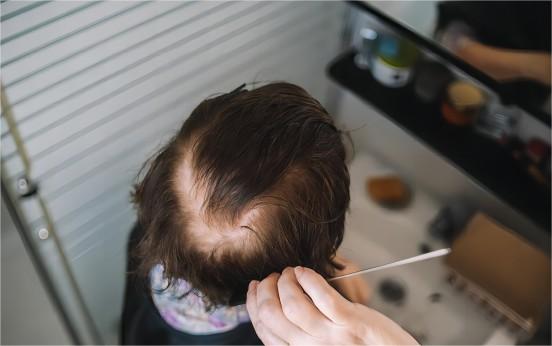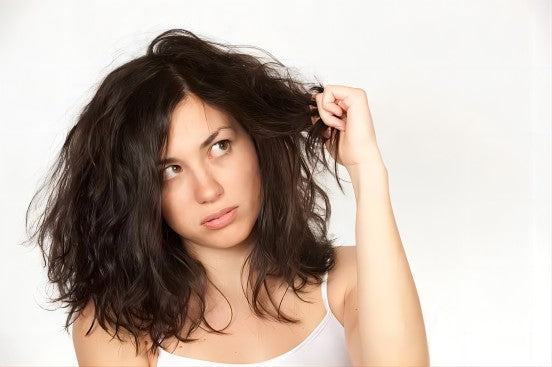1. The Science Behind Scalp Massage:Does Massaging Scalp Help Hair Grow?
Let's uncover the scientific underpinnings of why scalp massage is so effective in promoting healthy hair.
Improved Blood Circulation: Scalp massage increases blood flow to the hair follicles. This enhanced circulation means more oxygen and essential nutrients reach the follicles, promoting healthier hair growth.
Stress Reduction: Scalp massage is incredibly relaxing and helps reduce stress. Lower stress levels can have a positive impact on hair health by reducing hair loss caused by stress-related factors.
DHT Reduction: Some studies suggest that scalp massage can help reduce the levels of dihydrotestosterone (DHT), a hormone linked to hair loss in some individuals.
Sebum Regulation: Massaging the scalp can distribute natural oils evenly, preventing excess oil buildup or dryness, which can lead to hair issues.

2. Choosing the Right Oil for Scalp Massage:
Selecting the appropriate oil for your scalp massage is crucial, as different oils offer unique benefits for hair health. Here, we'll explore the most popular options and their advantages.
Coconut Oil: Known for its deep moisturizing properties, coconut oil can help combat dryness and reduce protein loss in hair. It's particularly effective for individuals with dry or damaged hair.

Jojoba Oil: This lightweight and easily absorbable oil closely mimic the natural oils produced by the scalp. It's excellent for balancing oil production and can help with issues like dandruff and excess sebum.
Almond Oil: Rich in vitamins and minerals, almond oil promotes hair growth and strengthens hair from the roots. It also contains fatty acids that add shine and softness.

Castor Oil: If you're looking to boost hair growth, castor oil is a go-to option. It's thick and viscous, making it ideal for massaging into the scalp to stimulate hair follicles.
Olive Oil: Packed with antioxidants and anti-inflammatory properties, olive oil nourishes the scalp, reduces dandruff, and adds shine to your locks.

3. DIY Scalp Massage Techniques:
It's time to get hands-on! We'll provide a step-by-step guide to performing effective scalp massages at home.
Preparation: Start with clean, dry hair. You can use your fingertips or a soft brush to gently detangle your hair before starting the massage.
Warm-Up: Begin by warming up your hands and fingers. Use gentle circular motions all over your scalp to prepare it for the massage.
Application of Oil: If you're using oil, warm it slightly, and apply it evenly to your scalp. This step adds an extra layer of nourishment and lubrication.
The Massage Technique: Use the pads of your fingers, not your nails, to apply gentle pressure. Start at the front of your scalp and work your way to the back, using circular motions. Don't forget to include the sides. It's important to maintain a relaxed and comfortable posture during the massage.
Duration: The ideal duration for a scalp massage varies, but it generally ranges from 5 to 20 minutes. Adjust the time to your preference and comfort level.
4. Frequency and Duration For Massaging Scalp To Grow Hair :
Finding the right balance for how often and how long to perform scalp massages is essential for seeing results.
Frequency: For most people, 1-2 times a week is a good starting point. However, you can adjust this based on your hair type and individual needs. Pay attention to how your hair responds.
Duration: The duration of your scalp massage can also vary. It's essential to be consistent. A shorter daily massage can be just as effective as a longer one, so choose what fits your schedule and lifestyle best.
5. Combining Scalp Massage with Other Hair Care Practices:
To maximize the benefits of scalp massage, it's crucial to incorporate it into a holistic hair care routine.Balanced Diet: A diet rich in vitamins, minerals, and protein is essential for healthy hair. Include foods like fruits, vegetables, lean proteins, and nuts to provide your hair with the nutrients it needs.
Hydration: Drinking enough water keeps your hair and scalp hydrated, which is essential for overall hair health.
Stress Management: High stress levels can lead to hair loss. Incorporate stress-reduction techniques such as meditation, yoga, or regular exercise into your routine.
Gentle Hair Care: Avoid harsh hair products, excessive heat styling, and tight hairstyles that can damage your hair. Choose products that suit your hair type and needs.
By covering these subtopics in-depth, your readers will have a comprehensive understanding of scalp massage for healthy hair and be well-equipped to incorporate this practice into their hair care routine effectively.





